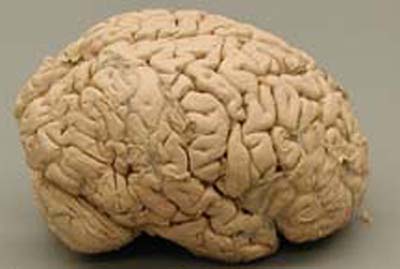Serendip is an independent site partnering with faculty at multiple colleges and universities around the world. Happy exploring!
Mental Health and the Brain: Topic Suggestions

|
Mental Health and the Brain:
|

|
Suggested Topics/Starting Points
The Significance of Genes
- Genes, Brain, and Behavior. Serendip, 2003.
- Gene Hunt Hints at Cause of Bipolar Disorder. NY Times, 18 Aug 2008. http://www.nytimes.com/2008/08/15/science/15visual.html
- Gene-Hunters Find Hope and Hurdles in Schizophrenia Studies. NY Times, 31 July 2008.
- Genes and Depression. US News and World Report. 4 September 2008.
Pharmacotherapy
- Matter over Mind. Boston College Magazine. David Karp. Boston College Magazine. Summer, 2006.
- Listening to Prozac. Peter Kramer. Viking. 1993.
- Big Pharma and American Psychiatry: The Good, the Bad, and the Ugly. Steven Sharfstein. Psychiatric News, 19 August 2005.
Psychodynamic Psychotherapy
- Making the Unconscious Conscious, and Vice Versa: A Bi-Directional Bridge Between Neuroscience/Cognitive Science and Psychotherapy. Paul Grobstein. Cortex, 2005.
- On the Astonishing Clinical Irrelevance of Neuroscience Sydney Pulver. J. Amer. Psychoanal. Assn., 2003.
- Freud Returns. Mark Solms. Scientific American, 2004.
- Implications of Research in Cognitive Neuroscience for Psychodynamic Psychotherapy. Drew Westen. Oxford Textbook of Pschotherapy, 2005.
- "Have You Ever Been in Psychotherapy, Doctor?". Richard Friedman. NY Times. 19 February 2008.
- Is Personal Psychotherapy Still Crucial for Residents? Psychiatr. News, 4 May 2007
Cognitive/behavioral therapy
- Academy of Cognitive Therapy
- Cognitive Theory of Depression. Aaron Beck, John Rush, Brain Shaw. Guilford Press. 1979.
- Brain Data Reveal Why Psychotherapy Works. Psychiatric News. 2004.
Additional forms of therapy
- Psychotherapy for All: An Experiment. NY Times. 11 March 2008.
- Story Hour: The Use of Narrative Therapy with Families. Serendip. Sarah Gibbs, 2007.
- Logotherapy
- Faith and Healing. Jerome Groopman. NY Times Book Review. 27 January 2008.
- The Lure of Treatments Science Has Dismissed. NY Times Book Review. 25 December, 2007.
Classification
- The Diagnostic and Statistical Manual of Mental Disorders (DSM)
- The Man Behind Psychiatry's Diagnostic Manual. NPR. 18 August, 2003.
- Bipolar Disorder: Particle or Wave? DSM Categories or Spectrum Dimensions? James Phelps. Psychiatric Times. 1 July 2006.
- Psychiatry Handbook Linked to Drug Industry. NY Times. 6 May 2008.
- The Psychodynamic Diagnostic Manual.
Schizophrenia
- Visualizing Schizophrenia and Schizophrenia and the Brain, NY Times, 4 September 2008.
Depression
Anxiety
Obsessive/Compulsive Behavior
Addiction
Eating Behavior
- Measure for Measure: An Artistic Exploration of Eating Disorders, Body Image, and the Self. Janna Stern and Serendip. 2000.
- Sorry Your Eating Disorder Doesn't Meet Our Criteria. New York Times. 30 November 2004.
Social Behavior
- Autism
- Williams Syndrome
- Anti-social behavior, criminality
Personality Disorder
Self-injury
Childhood and Adolesence
- Troubled Children: A Series, NY Times
Traumatic Stress
At the Border
- Chronic fatigue syndrome
- Fibromyalgia
- Battle fatigue
- Unexplained Physical Symptoms: What's a Psychiatrist to Do? Humberto Marin and Javier Escobar. Psychiatric Times. 1 August 2008.
Community Mental Health
- Rolling the Rock: Why Would Anyone Choose a Career in Community Mental Health Today? David Dan. Psychotherapy Networker. August, 2008.
Special Education
Mental Health Parity
- House Approves Bill on Mental Health Parity, NY Times, 6 March 2008
- Insurance Parity, from Mental Health America



Comments
Therapeutic relationship/alliance
cross cultural perspective
Another possibility would be to think of mental health as a contemporary cultural phenomenon, and compare contemporary Western/American perspectives with either the historical record or other contemporary cultures, by going to the historical and anthropological literature. So too, looking explicitly at discussions that focus on class and/or race and mental health, as a way of pulling apart middle class western assumptions in thinking about normalcy, deviance, stigma, the possible roles of government policy and the health profession, religion, etc.
mental health: historical/cultural contexts
and gender
and gender.
am thinking of classic 19th c. American texts--Charlotte Perkins Gilman's "The Yellow Wallpaper," Emily Dickinson's "Much Madness is Divinest Sense," Kate Chopin's The Awakening--as examples of a culture so out of joint that sane women seemed mad....
Post new comment